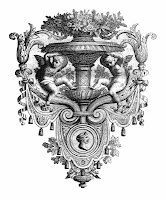RAPSODIA DE UNA
NOCHE VENTOSA
Las doce en punto.
A lo largo de la calle
Tenida en síntesis lunar,
Sibilantes encantaciones lunares
Disuelven los pisos de la memoria
Y todas sus claras relaciones,
Sus divisiones y precisiones,
Cada farol de la calle que dejo a mis espaldas
Suena como fatídico tambor,
Y en los espacios de la oscura
Medianoche sacude la memoria
Como un loco sacude un geranio muerto.
La una y media,
El farol de la calle chisporroteaba,
El farol de la calle refunfuñaba,
El farol de la calle decía: “Mira esa mujer
Que hesita frente a ti en el vano de la puerta
Que se abre sobre ella como una mueca.
Ves que la orla de su vestido
Está rota y manchada de arena,
Y ves que sus ojos
Se tuercen como alfileres de gancho”.
La memoria despide en multitud
Una resaca de cosas torcidas;
Una torcida rama sobre la playa
Roída, y pulida
Como si el mundo revelara
El secreto de su esqueleto,
Rígido y blanco.
Una cuerda rota en mi patio de fábrica,
Moho que adhiere a la forma que la fuerza ha dejado
Dura y abarquillada y pronta a saltar.
Las dos y media,
El farol de la calle decía:
“Observa el gato que se arrastra por el albañal,
Saca su lengua
Y devora mi pedazo de manteca rancia”.
Así la mano de un chico, automática,
Saltó del bolsillo y restituyó a él un juguete que disparaba por el muelle.
Yo no podía ver nada tras los ojos de aquel niño.
He visto en la calle ojos
Que trataban de atisbar entre persianas iluminadas,
Y una tarde en un pozo un cangrejo,
Un viejo cangrejo con antiparras en el lomo,
Que apretó la punta de un palo que le puse por delante.
Las tres y media,
El farol chisporroteaba,
El farol refunfuñaba en la oscuridad.
El farol susurraba:
“Mira la luna,
La lune ne garde aucune rancune,
Que guiña un ojo enfermizo,
Que sonríe en los rincones.
Ella suaviza el cabello de la hierba.
La luna ha perdido su memoria.
Unas borradas viruelas agrietan su cara,
Su mano trenza una rosa de papel,
Que huele a polvo y agua de Colonia;
Está sola
Con todos los olores nocturnos
Que se entrecruzan de un lado para otro en su cerebro”.
Y viene la reminiscencia
De secos geranios sin sol
Y del polvo en las grietas,
Olores de castañas en las calles,
Y olores femeninos en habitaciones cerradas,
Y cigarrillos en los corredores
Y olor a cocktails en los bares.
El farol decía:
“Las cuatro en punto,
Aquí está el número en la puerta.
¡Memoria!
Tienes la llave,
El farolito desparrama un anillo sobre la escalera.
Sube.
La cama está abierta; el cepillo de dientes pende del muro,
Pon tus zapatos en la puerta, duerme, prepárate para la vida”.
La última quebrada de la navaja.
Prufrock and others
observations (1917)
Versión española de JULIO IRAZUSTA
Revista Sur, febrero de 1937
Twelve o’clock.
Along the reaches of
the street
Held in a lunar
synthesis,
Whispering lunar
incantations
Dissolve the floors of
memory
And all its clear
relations,
Its divisions and
precisions.
Every street-lamp that
I pass
Beats like a fatalistic
drum,
And through the spaces
of the dark
Midnight shakes the
memory
As a madman shakes a
dead geranium.
Half-past one,
The street-lamp
sputtered,
The street-lamp
muttered,
The street-lamp said,
‘Regard that woman
Who hesitates toward
you in the light of the door
Which opens on her like
a grin.
You see the border of
her dress
Is torn and stained
with sand,
And you see the corner
of her eye
Twists like a crooked pin.’
The memory throws up
high and dry
A crowd of twisted
things;
A twisted branch upon
the beach
Eaten smooth, and
polished
As if the world gave up
The secret of its
skeleton,
Stiff and white.
A broken spring in a
factory yard,
Rust that clings to the
form that the strength has left
Hard and curled and
ready to snap.
Half-past two,
The street-lamp said,
‘Remark the cat which
flattens itself in the gutter,
Slips out its tongue
And devours a morsel of
rancid butter.’
So the hand of the
child, automatic,
Slipped out and
pocketed a toy that was running along the quay.
I could see nothing
behind that child’s eye.
I have seen eyes in the
street
Trying to peer through
lighted shutters,
And a crab one
afternoon in a pool,
An old crab with
barnacles on his back,
Gripped the end of a
stick which I held him.
Half-past three,
The lamp sputtered,
The lamp muttered in
the dark.
The lamp hummed:
‘Regard the moon,
La lune ne garde aucune rancune,
She winks a feeble eye,
She smiles into
corners.
She smooths the hair of
the grass.
The moon has lost her
memory.
A washed-out smallpox
cracks her face,
Her hand twists a paper
rose,
That smells of dust and
eau de Cologne,
She is alone
With all the old
nocturnal smells
That cross and cross
across her brain.’
The reminiscence comes
Of sunless dry
geraniums
And dust in crevices,
Smells of chestnuts in
the streets,
And female smells in
shuttered rooms,
And cigarettes in
corridors
And cocktail smells in bars.
The lamp said,
‘Four o’clock,
Here is the number on
the door.
Memory!
You have the key,
The little lamp spreads
a ring on the stair.
Mount.
The bed is open; the
tooth-brush hangs on the wall,
Put your shoes at the
door, sleep, prepare for life.’


